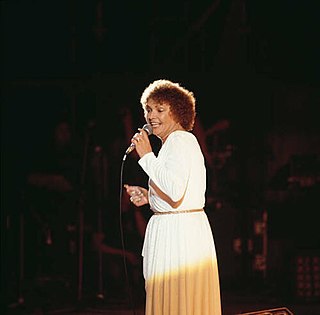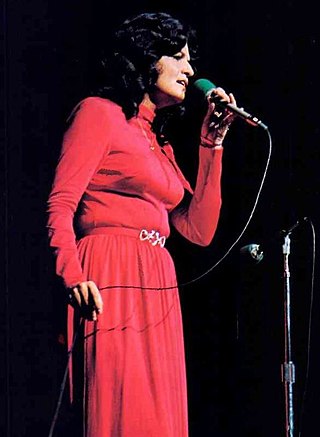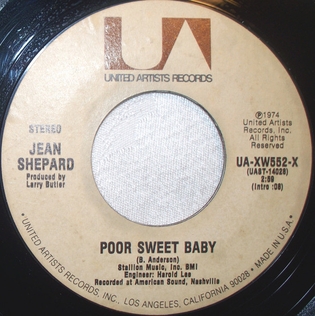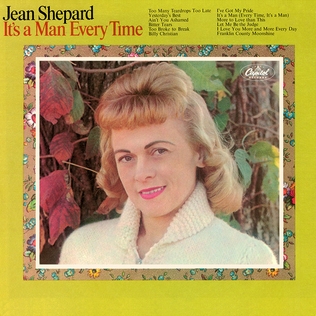
Connie Smith is an American country music singer and songwriter. Her contralto vocals have been described by music writers as significant and influential to the women of country music. A similarity has been noted between her vocal style and the stylings of country vocalist Patsy Cline. Other performers have cited Smith as influence on their own singing styles, which has been reflected in quotes and interviews over the years.

Marilyn Jeanne Seely is an American singer, songwriter, record producer, actress and author. Most notably identified with the country music genre, Seely found success with the Grammy Award-winning song "Don't Touch Me" (1966). Her soul-inspired vocal delivery gave her the nickname of "Miss Country Soul". Seely is also known for her membership and presence on the Grand Ole Opry, having appeared more times on the program than any other performer.

Dottie West was an American country singer and songwriter. She also had several credits as an actress. A distinguished figure in the country genre, West was among several people who helped to elevate the platform of female country artists. She was also known for mentoring up-and-coming artists and being the first woman to win a country music accolade from the Grammy Awards.

Billie Jo Spears was an American country music singer. She was known for a series of singles whose characters often represented women in assertive positions. Among these recordings was a song about sexual harassment, and a song about rekindling sexual desire ".

Jeanne Pruett is an American country music singer and songwriter. She also has credits as a published author. Pruett had several major hits as a music artist, but became best-known for 1973's "Satin Sheets". The song topped the country music charts and helped her secure a membership in the Grand Ole Opry cast.

Harold Franklin "Hawkshaw" Hawkins was an American country music singer popular from the 1950s into the early 1960s. He was known for his rich, smooth vocals and music drawn from blues, boogie and honky tonk. At 6 feet 5 inches (1.96 m) tall, Hawkins had an imposing stage presence, and he dressed more conservatively than some other male country singers. Hawkins died in the 1963 plane crash that also killed country stars Patsy Cline and Cowboy Copas. He was a member of the Grand Ole Opry and was married to country star Jean Shepard.

Ollie Imogene "Jean" Shepard, was an American country singer who was considered by many writers and authors to be one of the genre's first significant female artists. Her early successes during the 1950s decade were said to influence the future careers of Loretta Lynn, Dolly Parton and Tammy Wynette.

"Slippin' Away" is a song written by American singer-songwriter Bill Anderson and was originally recorded by American country singer Jean Shepard. Inspired to write the song while watching an old film, Shepard chose to the song to record and it was released as her first single for the United Artists label in 1973. It became her first top ten US country song in several years and was issued on an album of the same name.

"I Want to Go Where No One Knows Me" is a song written by Kenneth Grant and Jerry Jericho. It was originally recorded by American country singer Jean Shepard. Released as a single in 1958, it reached the top 20 of the US country chart.

"Second Fiddle (To an Old Guitar)" is a song written by Betty Amos that was originally recorded by American country singer Jean Shepard. It was released as a single by Capitol Records in 1964, reaching the top five of the US Country chart. The song featured Shepard yodeling and was her first top ten single in ten years. The song would later be nominated by the Grammy Awards.

"If Teardrops Were Silver" is a song written by Don Wayne that was originally recorded by American country singer Jean Shepard. It was released as a single by Capitol Records in 1966, reaching the US country top ten that year. It received positive responses from Cashbox and Record World magazines. It was included on her 1967 studio album of a Heart, We Did All That We Could.

"At the Time" is a song written by Bill Anderson that was recorded by American country singer Jean Shepard. Released as a single by United Artists Records, it reached the top 20 of the US country chart in 1974. It was the second single written by Anderson that Shepard recorded. It was given positive reviews from magazines and books following its release.

"Poor Sweet Baby" is a song written by American singer-songwriter Bill Anderson that was originally recorded by American country singer Jean Shepard. Released as a single by United Artists Records in 1974, it reached the top 20 of the US and Canadian country charts in early 1975. It would serve as the title track to Shepard's 1975 studio album Poor Sweet Baby...And Ten More Bill Anderson Songs.

Cristy Lane Salutes G.I.'s of Viet Nam is a studio album by American country and Christian artist Cristy Lane. It was released in 1969 via Lane Records and contained a total of 13 tracks. The album was Lane's debut studio album in her recording career and featured songs Lane performed during concert tour entertaining troops during the Vietnam War.

"Midnight Angel" is a song written by Bill Anthony and Bob Morrison, recorded by American country music artist Barbara Mandrell. It was released in November 1976 as the first single and title track from the album Midnight Angel. It reached the top 20 of the American country songs chart.

It's a Man Every Time is a studio album by American country singer Jean Shepard. It was released in November 1965 by Capitol Records and featured 12 tracks. The album's title track was its only single. It was given a positive reception by Billboard magazine following its release and was her second album to make the US country chart.
"Have Heart, Will Love" is a song written by Sid Tepper and Roy C. Bennett. It was originally recorded by American country singer Jean Shepard. Released as a single in 1959, it reached the top 30 of the US country chart.

Heart, We Did All That We Could is a studio album by American country singer Jean Shepard. It was released in March 1967 by Capitol Records and featured 12 tracks. The album's material centered on heartbreak and despair. Six of the tracks were originally singles released between 1963 and 1967. Both "Second Fiddle " and "If Teardrops Were Silver" reached the US country top ten, while the title track reached the top 20. The album itself reached the US country top ten in 1967. The disc received positive reviews from both Billboard and Cashbox.

"Another Neon Night" is a song written by Carolyn Sue Howard and Joanne Spain that was originally recorded by American country singer Jean Shepard. It was released as the second single from her studio album I'm a Believer, reaching country chart positions in both the US and Canada. Describing a one-night-stand, the song has been described as being one of Shepard's best tracks and one of her favorite recordings as well.

I'm a Believer is a studio album by American country singer Jean Shepard. It was released by United Artists Records in November 1975 and was her twenty third studio recording. The album was a collection of ten tracks that mixed new songs with cover material. Among its new selections were two singles: the title track and "Another Neon Night". Both made the US country chart in 1975. The album was give positive reviews from music publications following its release.



















